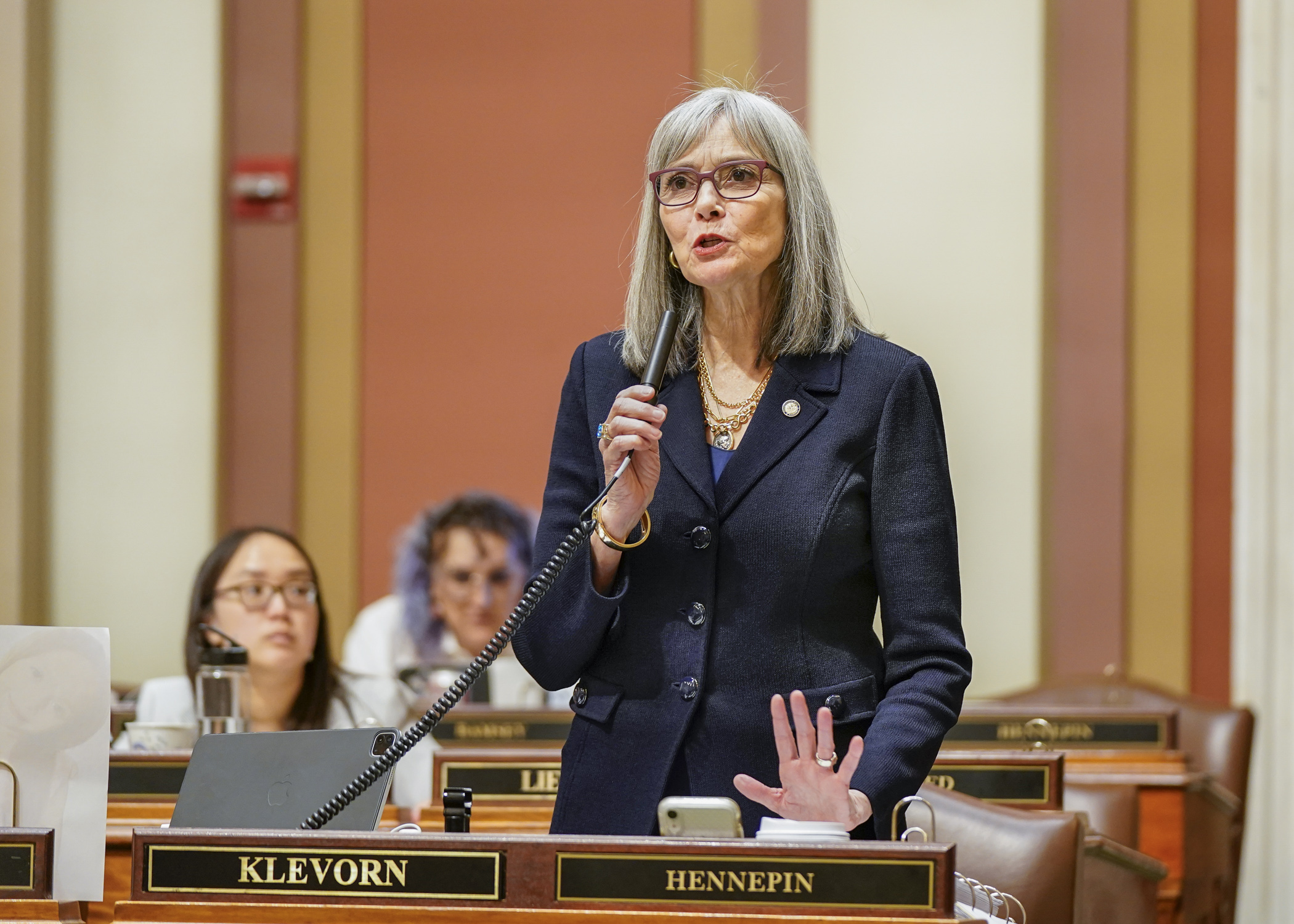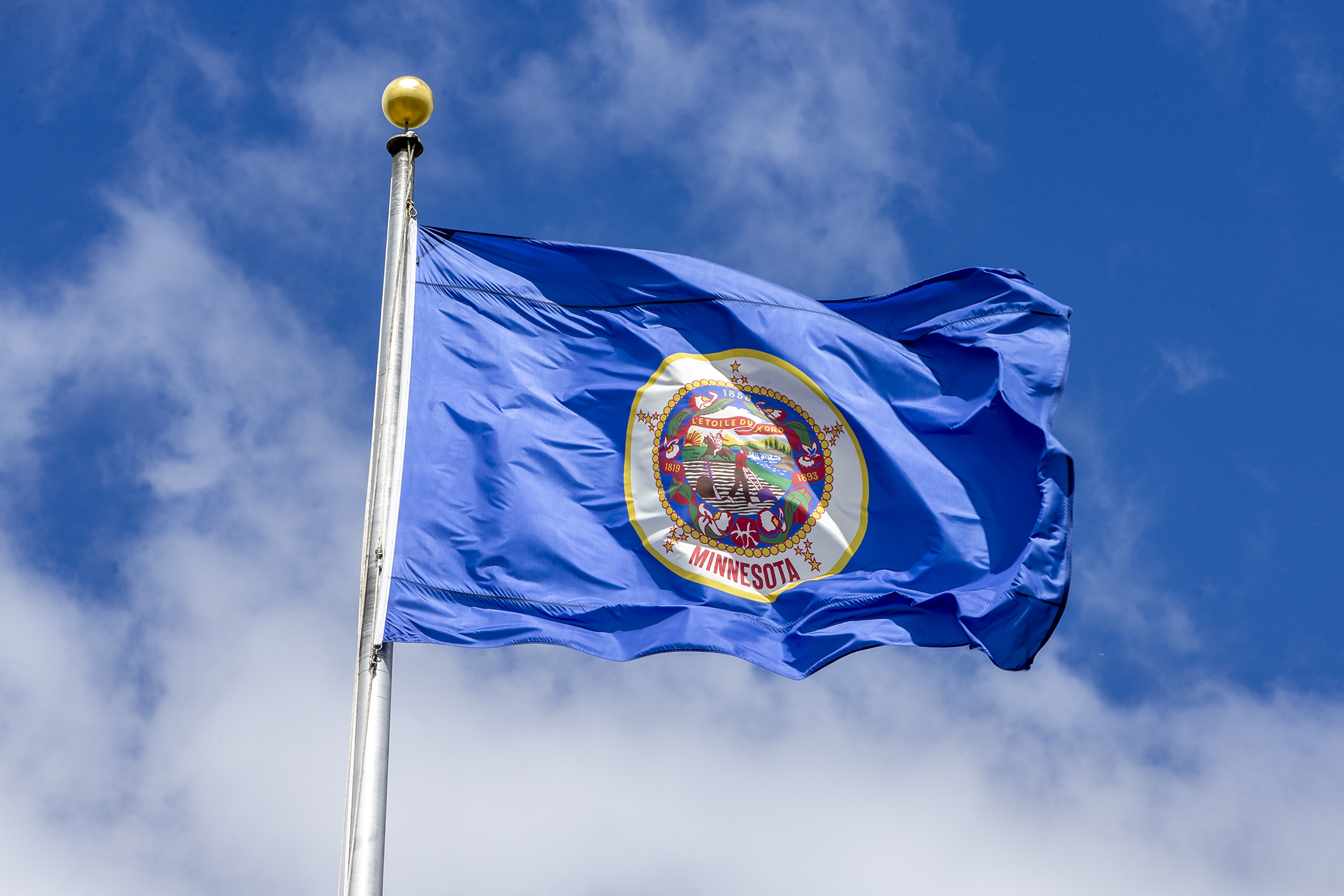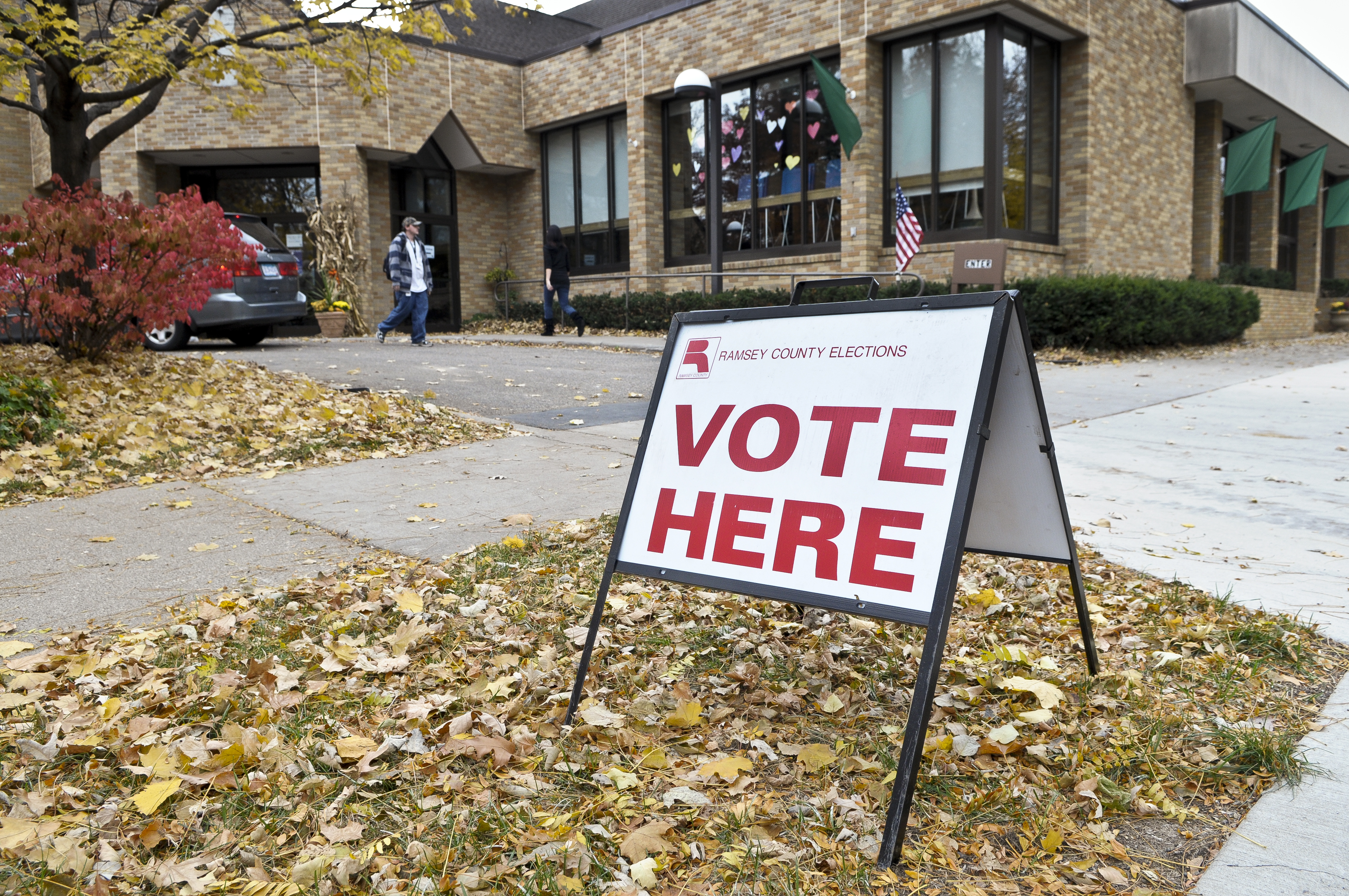House passes omnibus state government bill that includes elections funding, state flag change

— UPDATED at 10:19 p.m. with vote
A broad bill that includes funding for both the executive and legislative branches along with nearly three-dozen state departments or agencies is either desperately needed or drastic overreach.
Ultimately, the omnibus state government and elections finance bill was passed 70-59 by the House Tuesday night and sent to the Senate.
Rep. Ginny Klevorn (DFL-Plymouth) sponsors HF1830, that she says, as amended, reflects a balanced approach needed for the “backbone” of state government to serve Minnesotans.
“Minnesotans expect government to work and to meet their needs without delay or interruption,” she said. “... There are many provisions that will restore our state government after decades of funding neglect.”
Bill spending would be $1.59 billion — nearly $1.57 billion for state and local government and $24.1 million for elections. For the government portions, it is a net almost $400 million increase over base; for elections, $9.5 million. In total, the bill contains a net 41% increase over base in state government spending.
[MORE: Download the state and local government change items, more detailed spreadsheet]
“Democrats are on a spending spree,” House Minority Leader Lisa Demuth (R-Cold Spring) said at a pre-session news conference. “Government bureaucracy is the only thing benefitting out of this bill. There’s pay raises for politicians, massive budget increases for agencies and doubling down on wasteful spending like the State Office Building renovation. It is outrageous.”
Quoting renowned author and poet Oscar Wilde, Rep. Jim Nash (R-Waconia) said, “The bureaucracy is expanding to meet the needs of the expanding bureaucracy.”
Executive Branch
The Office of the Attorney General would see a $37.8 million increase, including a $12.76 million base operating adjustment beginning in fiscal year 2024 to attract and retain top talent, ensure sufficient staff and technology upgrades. A onetime nearly $10 million adjustment in fiscal year 2024 is included, as is a $2.5 million one-time adjustment in fiscal year 2024 for enhanced antitrust and nonprofit oversight.
The governor’s office is to receive an additional $10.94 million operating adjustment. An Office of Tribal Relations would be established within the office with $290,000 in fiscal year 2024.
An additional $5.8 million is targeted to the state auditor’s office, including an operating adjustment and for technology staffing; and $4.08 million in additional funding would be directed to the Office of the Secretary of State, including $1.12 million to support increasing needs of county and municipal administrators, to further support voters and to respond to increased data practices requests.
Almost $2.6 million from the General Fund would create a voting operations, technology, and election resources account in the special revenue fund to help local elections officials with costs. And $461,000 would provide a state requirement for receiving federal Help America Vote Act funds used to improve election security and enhance election-related technology. Plus, the bill would eliminate the legislative requirement of fund use approval, instead sending the money directly to the Office of the Secretary of State.
[MORE: Download the elections spreadsheet]
Other spending increases
The bill calls for $140.8 million in new spending for Minnesota IT Services, much it onetime. That includes $45 million to modernize targeted applications to improve user experiences with digital services provided by state agencies, almost $33.6 million for executive branch cloud transformation, $32.9 million for cybersecurity enhancements, and $1.2 million to support accessible government in Minnesota. A structure would be created to allocate $5.73 million in local government cybersecurity grants called for in the bill.
Increased funding related to legislative activity totals $74.13 million:
 HF1830 includes $45,000 to fund a 13-member State Emblems Redesign Commission to develop and adopt a new design for the official state flag and the official state seal no later than Jan. 1, 2024. (House Photography file photo)
HF1830 includes $45,000 to fund a 13-member State Emblems Redesign Commission to develop and adopt a new design for the official state flag and the official state seal no later than Jan. 1, 2024. (House Photography file photo)- $47.18 million for the Legislative Coordinating Commission, which includes the Office of the Revisor of Statutes, Legislative Auditor, Legislative Reference Library and Legislative Budget Office;
- $15.74 million for House operations, including a $3,500 member salary increase based on a Legislative Salary Council report, a $20 retroactive per diem increase from $66 to $86 to match the Senate, and staff salary increases; and
- $9.8 million for Senate operations.
Open-ended appropriations for the House, Senate and LCC, would be created beginning July 1, 2025, meaning the bodies would have authority to spend any number of resources without legislative approval to meet their needs. Republicans say this is how the House Rules and Legislative Administration Committee in December 2022 approved an approximately $500 million plan to renovate and expand the State Office Building. An amendment to remove that statute was ruled out of order.
It would also remove the user-financing required in a 2014 law (and amended in 2015) to have parking fees pay for the debt service on a parking ramp associated with the Senate Office Building.
[MORE: Read more about the potential state government, elections changes]
State flag, seal changes
The bill includes $45,000 to fund a 13-member State Emblems Redesign Commission to develop and adopt a new design for the official state flag and the official state seal no later than Jan. 1, 2024.
Per the bill, “The designs must accurately and respectfully reflect Minnesota's shared history, resources, and diverse cultural communities. Symbols, emblems, or likenesses that represent only a single community or person, regardless of whether real or stylized, may not be included in a design.”
Rep. Mike Freiberg (DFL-Golden Valley), who sponsors the change as HF274, previously said imagery on the seal is “genocidal toward Native Americans,” and flag aesthetics are poor.
“If we’re going to change the state flag, the Legislature should make that change,” said Rep. Kurt Daudt (R-Crown).
An amendment to remove the commission was unsuccessful, as was one to require any state flag or seal change be approved by state voters.
Governor’s temporary housing
In light of the recent news that $17,000 per month is the cost to rent a 16,000-square-foot home for Gov. Tim Walz and his family when the governor’s residence is renovated, an amendment to limit the total was ultimately withdrawn, after a Klevorn amendment to the amendment essentially said no more could be spent than necessary.
By statute, “The governor's residence must be used for official ceremonial functions of the state, and to provide suitable living quarters for the governor of the state.”
Nash said he’s heard from no one who believes the rate is an appropriate use of public money. “The money that comes into state coffers comes from someone’s wallet and the chief executive should respect where it came from and not abuse it to the tune of $17,000 a month.”
State and local government policy
Plenty of policy with price tags is in the proposal, including $22 million to help counties fund the perpetuation of public land survey monuments, which is important in determining property rights; $5 million in fiscal year 2024 to implement an updated Capitol Mall Design Framework; and $252,000 to create a Legislative Task Force on Aging to review and develop state resources for an aging demographic.
The state’s Compensation Council would establish — rather than “assist the Legislature in establishing” — salaries for constitutional officers, Supreme Court justices, Court of Appeals and district court judges and the heads of some state and metropolitan agencies.
 (House Photography file photo)
(House Photography file photo)Daudt noted the governor appoints half the members, and Nash said it means the governor and others could essentially set their own salary. An amendment to delete Compensation Council changes was unsuccessful, as was an amendment to limit any increase to the rate of inflation.
Now located in the to-be-renovated State Office Bulding, an amendment to ensure space is created for Capitol Barber operations in the State Capitol was adopted. Another adopted amendment would ensure no net loss of green space on the Capitol campus when the State Office Building is expanded.
Elections changes
While many DFL election changes are in HF3 that was passed by the House last Thursday, more are included in this package, including a voter could cast a ballot using a live ballot box during the 18 days prior to an election, major party definitional change, an employee could be absent from work without lost wages or other penalty for the needed time to vote during the 46 days prior to an election.
With more candidates bypassing the current state public campaign finance system, the bill would provide an additional $2.98 million in hopes of reducing the role of special-interest funding.
“The elections portion of this bill protects our election workers, makes voting more accessible and provides clarity on who is funding our elections,” said Freiberg, chair of the House Elections Finance and Policy Committee.
Rep. Emma Greenman (DFL-Mpls) spoke highly of changes that'd provide more protections for local election infrastructure and election workers, whom she says have had a tougher job since the 2020 election and Jan. 6 insurrection.
"Minnesotans who have worked in the background doing apolitical work of ensuring our elections run smoothly have unfortunately been thrust into the limelight which is an increasingly political environment, heated rhetoric, misinformation about voting machines, social media, and they have an irresponsible and misplaced target on their back," she said.
The bill would make Minnesota the 16th state to join the “Agreement Among the States to Elect the President by National Popular Vote" an interstate compact that’d take effect when enacted into law by states possessing 270 of the 538 available electoral votes. Currently, 15 states and the District of Columbia — a combined 195 electoral votes — have enacted the compact.
In addition to predicting constitutional court challenges, especially on the national popular vote provision, Rep. Paul Torkelson (R-Hanska) believes many provisions will have a negative impact on voter confidence and increase costs and workloads for local elections officials.
Plus, he says, the bill lacks the long-standing tradition of bipartisan election bills. “I’m calling it ‘The Protect DFL Victories Act II.’”
Related Articles
Search Session Daily
Advanced Search OptionsPriority Dailies
Speaker Emerita Melissa Hortman, husband killed in attack
By HPIS Staff House Speaker Emerita Melissa Hortman (DFL-Brooklyn Park) and her husband, Mark, were fatally shot in their home early Saturday morning.
Gov. Tim Walz announced the news dur...
House Speaker Emerita Melissa Hortman (DFL-Brooklyn Park) and her husband, Mark, were fatally shot in their home early Saturday morning.
Gov. Tim Walz announced the news dur...
Lawmakers deliver budget bills to governor's desk in one-day special session
By Mike Cook About that talk of needing all 21 hours left in a legislative day to complete a special session?
House members were more than up to the challenge Monday. Beginning at 10 a.m...
About that talk of needing all 21 hours left in a legislative day to complete a special session?
House members were more than up to the challenge Monday. Beginning at 10 a.m...